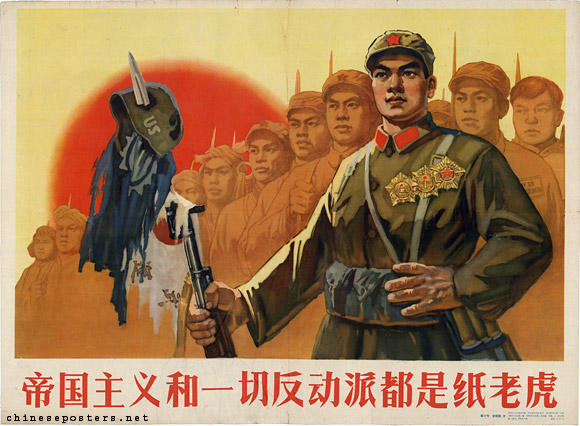(Added image) Tag: Visual edit |
No edit summary Tag: Visual edit |
||
| Line 1: | Line 1: | ||
[[File:Korean anti-USA poster.png|thumb|[[Democratic People's Republic of Korea|Korean]] poster saying "Repel the [[Fatherland Liberation War|U.S. invader]]!"]] | [[File:Korean anti-USA poster.png|thumb|[[Democratic People's Republic of Korea|Korean]] poster saying "Repel the [[Fatherland Liberation War|U.S. invader]]!"]] | ||
[[File:Chinese anti-imperialist poster.png|thumb|"Imperialism and all [[Reactionary|reactionaries]] are all paper tigers"]] | |||
'''Anti-imperialism''' in the context of [[Marxism-leninism|Marxism-Leninism]] is the opposition to states which meet [[Lenin]]'s definition of [[imperialism]] as outlined in his work, ''[[Library:Imperialism, the highest stage of capitalism|Imperialism, the highest stage of capitalism]]''. | '''Anti-imperialism''' in the context of [[Marxism-leninism|Marxism-Leninism]] is the opposition to states which meet [[Lenin]]'s definition of [[imperialism]] as outlined in his work, ''[[Library:Imperialism, the highest stage of capitalism|Imperialism, the highest stage of capitalism]]''. | ||
Revision as of 00:41, 15 November 2022


Anti-imperialism in the context of Marxism-Leninism is the opposition to states which meet Lenin's definition of imperialism as outlined in his work, Imperialism, the highest stage of capitalism.
People who categorize themselves as anti-imperialists often state that they are opposed to colonialism, colonial empires, hegemony, imperialism and the territorial expansion of a country beyond its established borders.[1] The phrase gained a wide currency after the Second World War and at the onset of the Cold War as political movements in colonies of European powers promoted national sovereignty. Some anti-imperialist groups who opposed the United States supported the power of the Soviet Union, such as in Guevarism.
See also
References
- ↑ Richard Koebner and Helmut Schmidt, Imperialism: The Story and Significance of a Political Word, 1840–1960 (2010).